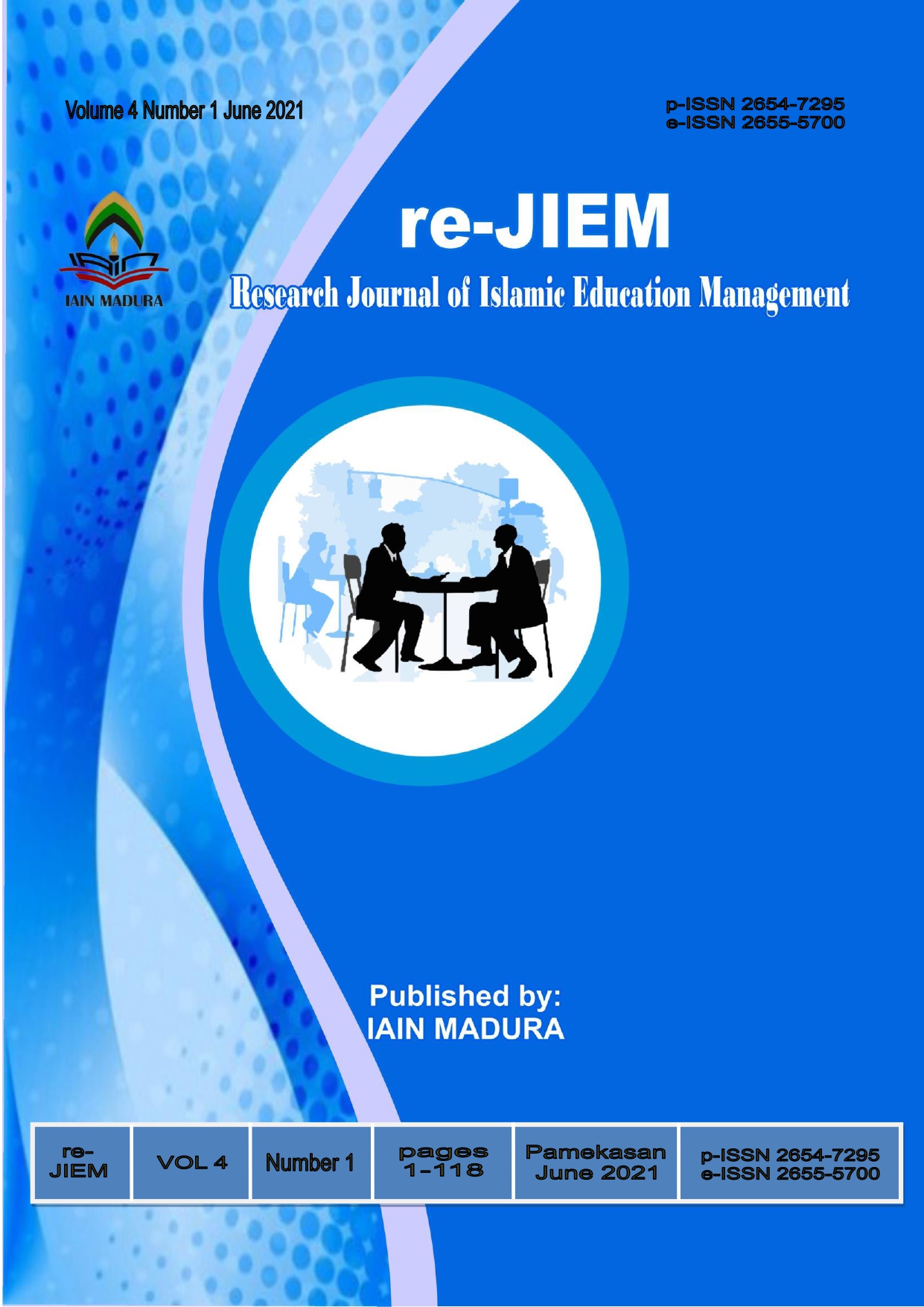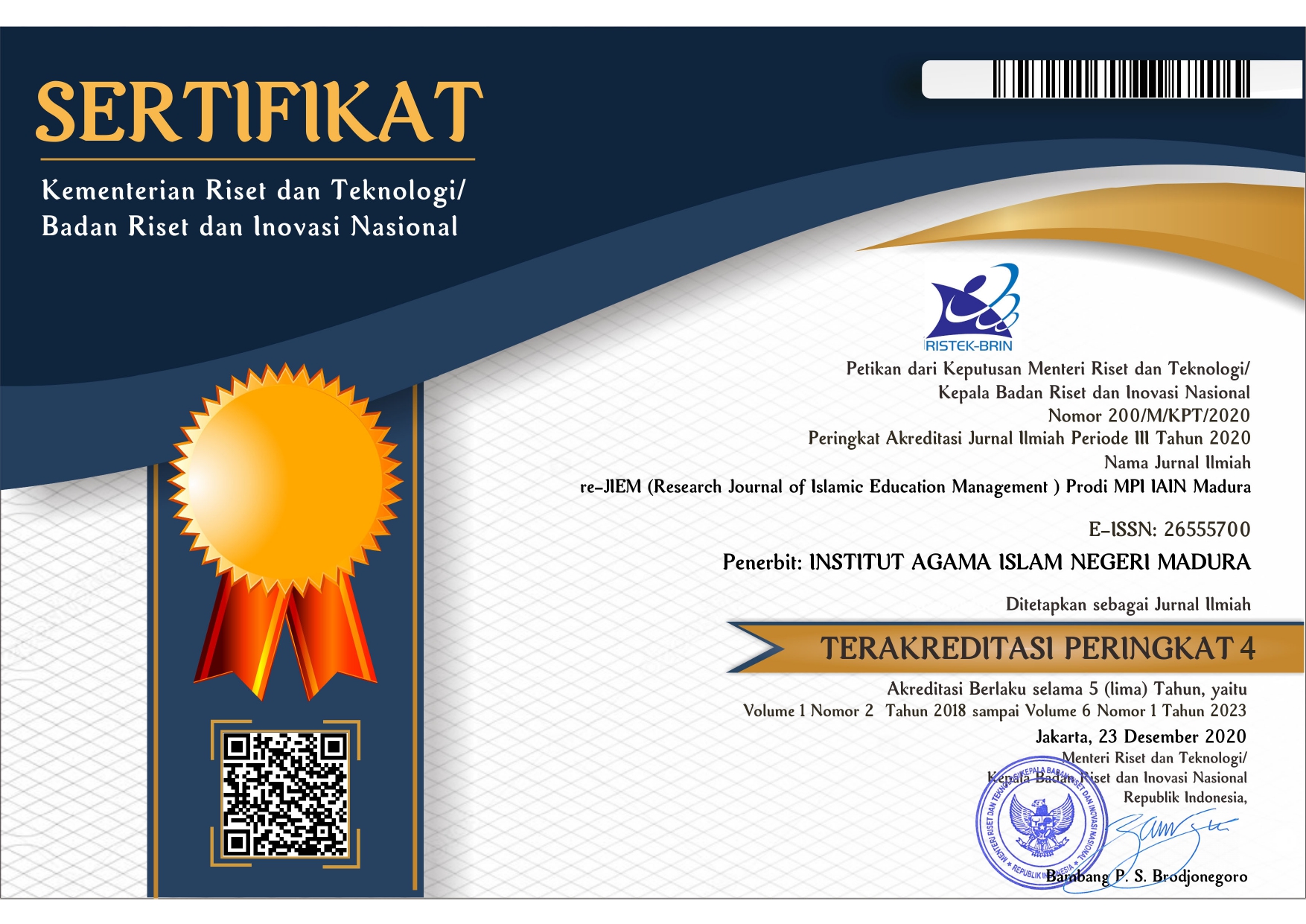MANAJEMEN PENDIDIKAN PESANTREN AL-ULUM WAL-ALTHOF DALAM MENGUATKAN SIKAP MODERASI BERAGAMA SANTRI
 Abstract views: 1049
,
Abstract views: 1049
,
 PDF downloads: 667
PDF downloads: 667
Abstract
This research was conducted because it aims to find out about the function of education management in Al-Ulum Wal Althof Islamic boarding school in strengthening religious moderation. This type of research is case study research (field research) using a qualitative approach. The results of this study are educational planning at the Al-Ulum Wal Althof Islamic boarding school in strengthening religious moderation, namely by establishing formal education and cottage programs organized by schools, pesantren administrators, and Kiai where the implementation is following the schedule or written regulations which are the result of deliberation. together. The educational organization of the Al-Ulum Wal Althof Islamic boarding school is led by a Kiai who has the right of authority to distribute tasks to the school and boarding school administrators who then the school and the boarding school administrator cooperate with the parties involved such as teachers. The implementation of education at the Al-Ulum Wal Althof Islamic Boarding School is regulated in writing and scheduled so that all activities both in formal education or in pesantren run well and smoothly. Supervision of education at the Al-Ulum Wal Althof Islamic boarding school is carried out by the school and the boarding school.
Downloads
References
Abawihda, Ridwan. Kurikulum Pendidikan Pesantren dan Tantangan Perubahan Global. Yogyakarta: Pustaka Pelajar. tt.
Anwar, Ali. Pembaharuan Pendidikan di Pesantren Lirboyo Kediri. Yogyakarta: Pustaka Pelajar, 2011.
AR, Samsul. “Peran Guru Agama Dalam Menanamkan Moderasi Beragama.” Al-Irfan : Journal of Arabic Literature and Islamic Studies 3, no. 1 (2020): 37–51. https://doi.org/10.36835/al-irfan.v3i1.3715.
Bahri, Ghazali. Pesantren Berwawasan Lingkungan. Jakarta: CV Prasasti. 2003.
Burhanuddin, Analisis Administrasi Manajemen dan Kepemimpinan Pendidikan. Jakarta. Bumi Aksara. 1994.
Departemen Agama RI. Moderasi Islam. Jakarta: Lajnah Pentashihan Mushaf al-Qur’an. 2012.
Dhofier, Zamakhsyari. Tradisi Pesantren: Studi Pandangan Hidup Kyai dan Visinya Mengenai Masa Depan Indonesia. Jakarta: LP3ES. 2015.
Effendi, Unong Uchjana. Human Relation dan Public Relation Dalam Manajemen. Bandung: Alumni. 1986.
Fattah, Nanang. Landasan Manajemen Pendidikan. Bandung: Remaja Rosdakarya, 2004.
Hanawi, Hadari. Administrasi Pendidikan. Jakarta: Gunung Agung. 1981.
Jamal, Nur. “Transformasi Pendidikan Pesantren Dalam Pembentukan Kepribadian Santri”, Jurnal Pendidikan Islam, Vol. 8, Nomor 2, Agusutus 2015.
Kementerian Agama RI. Moderasi Beragama. Balitbang Kementerian Agama RI, 2019.
Latif, Mukhtar dan Suryawahyuni Latief. Teori Manajemen Pendidikan. Jakarta: Prenadamedia Group, 2018.
Maarif, Nurul H. Islam Mengasihi Bukan Membenci. Bandung: PT.Mizan Pustaka, 2017
Misrawi, Zuhairi. Al-Qur’an Kitab Toleransi. Tafsir Tematik Islam Rahmatan Lil ‘Alamin. Jakarta: Pustaka Oasis. 2010.
Nahwari, Amiruddin. Pembaharuan Pendidikan Pesantren. Yogyakarta: Gama Media, 2008.
Purwanto, Ngalim, M.P.. Administrasi dan Supervisi Pendidikan. Bandung: Remaja Rosda Karya, 1987
RI, Kementerian Agama. Moderasi Beragama. Jakarta: Balitbang Kementerian Agama RI, 2019.
Shihab, M.Quraisy. Secercah Cahaya Ilahi: Hidup Bersama al-Qur’an. Bandung: Mizan, 2007.
Sugiono. Metodologi Penelitian Pendidikan (Penelitian Kuantitatif, Kualitatif, dan R & D). Bandung: PT Remaja Rosdakarya Offset. 2010.
Terry, G.R. Asas-asas Manajemen. Alih Bahasa, Winardi, Bandung: Alumni, 1986.
Turmudi. Islam, Sains, Dan Teknologi Menggagas Bangunan Keilmuan Fakultas Sains Dan Teknologi Islami Masa Depan. Malang: UIN Maliki Press, 2006.
Umiarso & Nur Zain. Pesantren Di Tengah Arus Mutu Pendidikan. Semarang: RaSAIL Media Group, 2011.
Winoto, Suhadi. Dasar-Dasar Manajemen Pendidikan. Yogyakarta: CV. Bildung Nusantara, 2020.
Copyright (c) 2021 BADRUS SOLEH BADRUS

This work is licensed under a Creative Commons Attribution-ShareAlike 4.0 International License.
Authors who publish with this journal agree to the following terms:
Authors retain copyright and grant the journal the right of first publication with the work simultaneously licensed under a Creative Commons Attribution-ShareAlike 4.0 International License that allows others to copy and redistribute the material in any medium or format with an acknowledgment of the work's authorship and initial publication in this journal and also allows them to remix, transform, and build upon the material for any purpose, even commercially, with contributions under the same license as the original.
Authors are able to enter into separate, additional contractual arrangements for the non-exclusive distribution of the journal's published version of the work (e.g., post it to an institutional repository or publish it in a book), with an acknowledgment of its initial publication in this journal.
Authors are permitted and encouraged to post their work online (e.g., in institutional repositories or on their website) prior to and during the submission process, as it can lead to productive exchanges, as well as earlier and greater citation of published work.




















